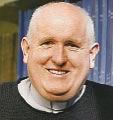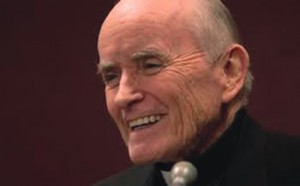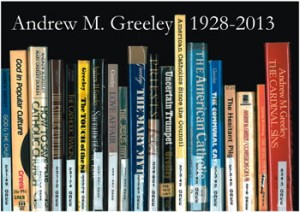Fr Greeley and “Daring to Say”
In May of this year a Chicago diocesan priest called Andrew Greeley died. For those of us who trained for priesthood in the 1970s and 1980s his books were all around us, and I, for one, was strongly influenced by his writings. He was a prolific author. A sociologist by training, he had the ability to popularize the ideas of other thinkers. He could take complex topics and express them simply and clearly. He published on an incredible range of topics. He was a professor of sociology but he wrote about priesthood, Catholic education, Vatican II, scripture scholarship, devotion to the Blessed Virgin Mary, Irish Americans, sex, war, social justice and more. I remember being captivated by what he had to say about the titles of Jesus in his little 1971 volume The Jesus Myth. “Myth” was an in-term in those days and did not imply “fanciful” but rather meant “what was believed about”.
I have just checked the catalogue of the Colin Library, now based in Auckland, which incorporates the library collection from Greenmeadows where I studied. There are 51 books by Fr Greeley in the catalogue. I pulled out a few of them for the photograph that illustrates this article.
Those who were jealous of Greeley’s extraordinary rate of publishing, popularity and breadth of output used to joke that “Andrew Greeley never had an unpublished thought”. After a decade or so of publishing non-fiction he branched out into writing novels. They were not great literature but they were fun yarns and always dealt with Catholic themes. After his rather racy Cardinal Sins came out in 1981 Fr Greeley himself joked “They will now be able to say that I have never had an unpublished fantasy!” The novels sold considerably better than the non-fiction.
From this firehose of ideas I pull out one, from The Jesus Myth. Greeley discusses the extraordinary intimacy of Jesus’ relationship with God, whom Jesus calls “Abba”.
He quotes the scripture scholar Joachim Jeremias about the utmost importance of the “Our Father” and the reverence with which the prayer was held in the early church. He then says:
The phrase “we presume to say” or “we dare to say” is very ancient. It goes back into the first century. I suppose that most of us who repeated the words every day at Mass, “audemus dicere”, thought of it as a quaint Latin phrase. We did not realize how bold and daring, how outrageous, how almost blasphemous it was to use such a word of God. Indeed some of the untrained liturgical enthusiasts quickly dropped the phrase when liturgical reform began. Once again we missed the point completely. Jesus was not merely the one so intimate with the Father that he would dare to address Him in a familiar tone; he was also the one to make it possible for the rest of us to speak to God, the Really Real, the Ground of Being, the Absolute, the Ultimate, the Infinite, in terms of affectionate familiarity. When Jesus called God “Abba,” he urged us to do so too; and that is the core of the message he proclaimed.”
Greeley lived to see the new translation of the English Mass. I imagine he was pleased to see, some forty years after he wrote that paragraph, how that text is now rendered in English:
Novus Ordo – Mass of Paul VI
1970s translation of
“Praecèptis salutàribus mòniti et divìna institutiòne formàti, audèmus dicere” --
Let us pray with confidence to the Father in the words our Saviour gave us:
New translation
At the Saviour’s command and formed by divine teaching we dare to say:
The phrase that delighted Fr Greeley, and which he considered so significant, was always part of the Latin text of the mass. It was obscured by the earlier English translation which turned “daring” into “confidence”.
The much more literal modern translation presents to us very plainly what the liturgy has been proclaiming for millennia – that it is an outrageous and wonderful thing to call God “Our Father”.



 Entries(RSS)
Entries(RSS)